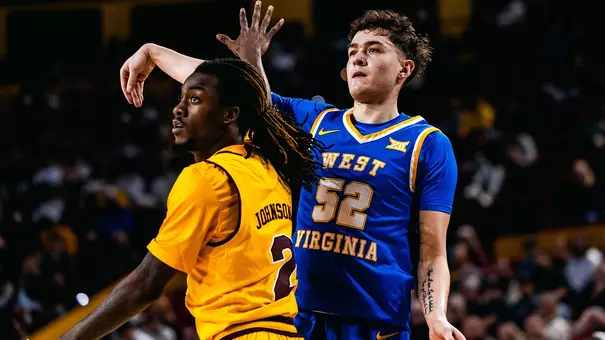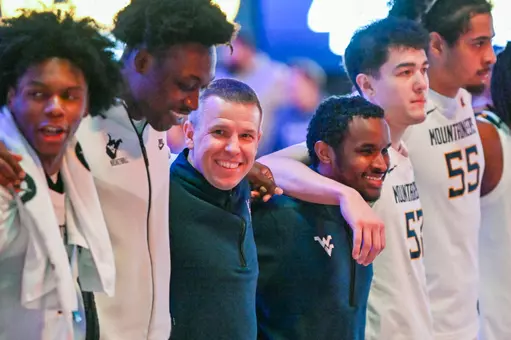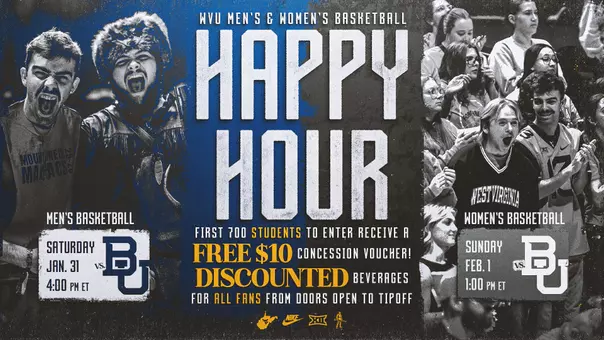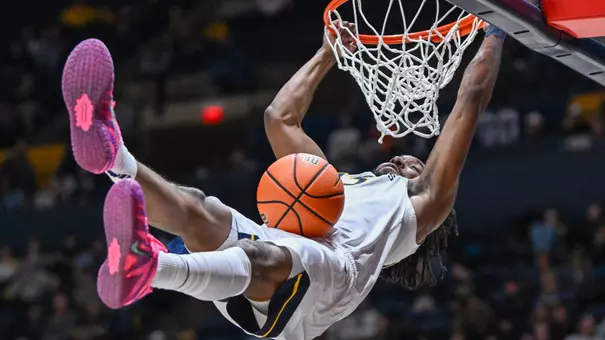Photo by: All Pro Photography/Dale Sparks
West Virginia Concludes Home Slate Wednesday Night Against TCU
March 05, 2024 03:53 PM | Men's Basketball
MORGANTOWN, W.Va. – A regular season unlike any other since West Virginia University first fielded a basketball team in 1904 is one step closer to wrapping up on Wednesday night inside the WVU Coliseum when the Mountaineers take on TCU in their final home game of the year.
The only instances that remotely approach what has transpired this year were in 1950, when coach Lee Patton sustained life threatening injuries in an auto accident returning from a game at Penn State and junior varsity coach Loren Ward coached the final six games, and in 2002, when veteran coach Gale Catlett took a leave of absence to deal with health problems and his nephew Drew Catlett filled in for him late in the year.
However, both rosters were intact and established well before the season.
This year actually began last June with the emergency hiring of interim coach Josh Eilert as teams near and far began poaching West Virginia's roster. Eilert managed to hold on to some players and added a few more in July and August, piecing together just enough to field a team for the 2023-24 season.
But fielding a team and developing a winning one in the Big 12, the nation's toughest men's basketball conference, are two entirely different matters.
"I said from the beginning, this was not a normal challenge," Eilert admitted Tuesday morning during his pregame news conference, frequently speaking softly and introspectively. "The sunshine and rainbows of getting up in front of a podium and starting the building process … I was put in a position that very few have ever been put in.
"I might be a case study in that regard," he added. "You tell me one other situation that was similar to this to where you are thrown into the fire late in the summer and you're trying to put together a roster to try and compete against the best of the best. There have been interim coaches that have taken over at different times, but the timing I was thrown in and our situation was unique and unlike others that interim head coaches faced before."
West Virginia fans used to seeing NCAA Tournament appearances and deep postseason runs weren't quite sure what to expect when the regular season opened on Nov. 6 against Missouri State.
Key transfers RaeQuan Battle and Kerr Kriisa were not in the lineup, and the continuation of Akok Akok's basketball career was an uncertainty after he suffered a medical emergency a week before in a charity exhibition game against George Mason.
A poor second half that contributed to West Virginia's 73-65 loss to Monmouth four days after the opener was a harbinger of things to come. WVU dropped subsequent games to SMU, Virginia, St. John's, Massachusetts and Radford as nonconference losses began piling up.
West Virginia got Kriisa back after a nine-game NCAA suspension and was the beneficiary of a district court ruling postponing the NCAA's transfer rules until after the season, allowing Battle and Noah Farrakhan to play immediately, but lost center Jesse Edwards for nearly a month to a broken wrist.
It seemed each step forward was followed by two steps backward.
"More than anything, there are certain points in everyone's life when you have to figure out how to navigate," Eilert explained. "You find out that people have a lot more to them than what meets the eye. Some of the conversations I've had throughout the year with other coaches have been very, very complimentary, which kind of throws me off.
"They say to me, 'You will learn more from this year than you will the rest of your coaching career. There are more life lessons and more lessons in terms of how you handle things in this one year than anything you will have to deal with the rest of your career,'" Eilert noted.
West Virginia got its first conference victory of the season against 25th-ranked Texas, upset third-ranked Kansas a week later and added a fine come-from-behind win over Cincinnati to end January.
Then came February, which proved extremely unkind.
West Virginia won only once, at home against Big 12 newbie UCF, as it sank to the bottom of the league standings. The cruelest outcome of all came on Feb. 26 at Kansas State when West Virginia battled back from a 25-point deficit with 13:04 left in the game to briefly take the lead.
The margin could have grown to four, but two free throws were missed with 24 seconds remaining, and K-State tied the game in regulation before winning it in overtime.
Last Saturday, an early 16-point lead evaporated, in part, because of ex-Mountaineer Joe Toussaint's fine play, and Texas Tech rallied to defeat WVU 81-70. Eilert was disappointed in the way his team finished that game, believing the fight was gone when the outcome was still in doubt.
"The last two and a half minutes of the Texas Tech game were probably as frustrated as I've been with them, and I let them know that," Eilert admitted. "I felt like the wind kind of fell out of their sails."
Added up, West Virginia shows nine wins and 20 losses with two regular season games and the Big 12 Tournament left. It's just the third time ever West Virginia has lost more than 20 games in a season – all three coming within the last 22 years.
Despite the team's struggles and hardships, Mountaineer fans have continued to show up and support the players and coaches. More than 11,000 came out last Saturday for the Texas Tech loss, and West Virginia has averaged 10,597 fans per game for its 17 home dates so far with Wednesday night's game remaining.
Excluding the COVID year in 2021 when the Coliseum's capacity was reduced to 1,420, WVU has averaged more than 10,000 fans per game each year since 2015. That's a great testament to the devotion and the commitment of Mountaineer Nation.
You would be hard-pressed to find that kind of fan support anywhere else in the Big 12 for a team at the bottom of the conference standings, or anywhere else in the country, for that matter.
Against 19-10, 8-8 TCU, West Virginia will recognize its six seniors prior to the game – Akok, Battle, Edwards, Kriisa, Quinn Slazinski and Patrick Suemnick, some of whom have college eligibility left, as well as team managers Conner Anders, Garret Hill and Alex Mergner and student athletic trainer Jacob Pinkerton.
"The ball is going to stop bouncing for a lot of these guys, and the lessons we've taught them I hope will carry on for years after their time here at West Virginia," Eilert said.
Eilert, too, might be coaching for the final time in the Coliseum with his nine-month appointment concluding at the end of this month. He said he's focused on the now instead of the past or the future.
What comes next is out of his control.
"I'm not putting too much thought into it," he said. "(Wednesday) is another beautiful opportunity. I've been here 17 years and in every single capacity, and I'm not going to let those emotions get the best of me. In our society, we sometimes have a hard time living in the present. We're worried about the past and concerned about what the future is going to hold, but we forget to appreciate the present.
"I've got one more opportunity (in the Coliseum) for sure, and I'm going to go out there with a smile on my face," Eilert said.
Whatever happens after the season, Josh Eilert will long be remembered and admired for taking over an impossible situation and conducting himself in a positive, professional and dignified manner. What he has learned this year will benefit him for the rest of his basketball career.
The tip time for Wednesday night's game has been moved up two hours to a 7 p.m. and television coverage has been switched to ESPN+ (Chuckie Kempf and Tim Welsh).
Mountaineer Sports Network radio coverage with Tony Caridi begins at 6 p.m. on stations throughout West Virginia, online via WVUsports.com and the Varsity and WVU Gameday apps.
Tickets remain and can be purchased by logging on to WVUGAME.com.
The only instances that remotely approach what has transpired this year were in 1950, when coach Lee Patton sustained life threatening injuries in an auto accident returning from a game at Penn State and junior varsity coach Loren Ward coached the final six games, and in 2002, when veteran coach Gale Catlett took a leave of absence to deal with health problems and his nephew Drew Catlett filled in for him late in the year.
However, both rosters were intact and established well before the season.
This year actually began last June with the emergency hiring of interim coach Josh Eilert as teams near and far began poaching West Virginia's roster. Eilert managed to hold on to some players and added a few more in July and August, piecing together just enough to field a team for the 2023-24 season.
But fielding a team and developing a winning one in the Big 12, the nation's toughest men's basketball conference, are two entirely different matters.
"I said from the beginning, this was not a normal challenge," Eilert admitted Tuesday morning during his pregame news conference, frequently speaking softly and introspectively. "The sunshine and rainbows of getting up in front of a podium and starting the building process … I was put in a position that very few have ever been put in.
"I might be a case study in that regard," he added. "You tell me one other situation that was similar to this to where you are thrown into the fire late in the summer and you're trying to put together a roster to try and compete against the best of the best. There have been interim coaches that have taken over at different times, but the timing I was thrown in and our situation was unique and unlike others that interim head coaches faced before."
West Virginia fans used to seeing NCAA Tournament appearances and deep postseason runs weren't quite sure what to expect when the regular season opened on Nov. 6 against Missouri State.
Key transfers RaeQuan Battle and Kerr Kriisa were not in the lineup, and the continuation of Akok Akok's basketball career was an uncertainty after he suffered a medical emergency a week before in a charity exhibition game against George Mason.
A poor second half that contributed to West Virginia's 73-65 loss to Monmouth four days after the opener was a harbinger of things to come. WVU dropped subsequent games to SMU, Virginia, St. John's, Massachusetts and Radford as nonconference losses began piling up.
West Virginia got Kriisa back after a nine-game NCAA suspension and was the beneficiary of a district court ruling postponing the NCAA's transfer rules until after the season, allowing Battle and Noah Farrakhan to play immediately, but lost center Jesse Edwards for nearly a month to a broken wrist.
It seemed each step forward was followed by two steps backward.
"More than anything, there are certain points in everyone's life when you have to figure out how to navigate," Eilert explained. "You find out that people have a lot more to them than what meets the eye. Some of the conversations I've had throughout the year with other coaches have been very, very complimentary, which kind of throws me off.
"They say to me, 'You will learn more from this year than you will the rest of your coaching career. There are more life lessons and more lessons in terms of how you handle things in this one year than anything you will have to deal with the rest of your career,'" Eilert noted.
West Virginia got its first conference victory of the season against 25th-ranked Texas, upset third-ranked Kansas a week later and added a fine come-from-behind win over Cincinnati to end January.
Then came February, which proved extremely unkind.
West Virginia won only once, at home against Big 12 newbie UCF, as it sank to the bottom of the league standings. The cruelest outcome of all came on Feb. 26 at Kansas State when West Virginia battled back from a 25-point deficit with 13:04 left in the game to briefly take the lead.
The margin could have grown to four, but two free throws were missed with 24 seconds remaining, and K-State tied the game in regulation before winning it in overtime.
Last Saturday, an early 16-point lead evaporated, in part, because of ex-Mountaineer Joe Toussaint's fine play, and Texas Tech rallied to defeat WVU 81-70. Eilert was disappointed in the way his team finished that game, believing the fight was gone when the outcome was still in doubt.
"The last two and a half minutes of the Texas Tech game were probably as frustrated as I've been with them, and I let them know that," Eilert admitted. "I felt like the wind kind of fell out of their sails."
Added up, West Virginia shows nine wins and 20 losses with two regular season games and the Big 12 Tournament left. It's just the third time ever West Virginia has lost more than 20 games in a season – all three coming within the last 22 years.
Despite the team's struggles and hardships, Mountaineer fans have continued to show up and support the players and coaches. More than 11,000 came out last Saturday for the Texas Tech loss, and West Virginia has averaged 10,597 fans per game for its 17 home dates so far with Wednesday night's game remaining.
Excluding the COVID year in 2021 when the Coliseum's capacity was reduced to 1,420, WVU has averaged more than 10,000 fans per game each year since 2015. That's a great testament to the devotion and the commitment of Mountaineer Nation.
You would be hard-pressed to find that kind of fan support anywhere else in the Big 12 for a team at the bottom of the conference standings, or anywhere else in the country, for that matter.
Against 19-10, 8-8 TCU, West Virginia will recognize its six seniors prior to the game – Akok, Battle, Edwards, Kriisa, Quinn Slazinski and Patrick Suemnick, some of whom have college eligibility left, as well as team managers Conner Anders, Garret Hill and Alex Mergner and student athletic trainer Jacob Pinkerton.
"The ball is going to stop bouncing for a lot of these guys, and the lessons we've taught them I hope will carry on for years after their time here at West Virginia," Eilert said.
Eilert, too, might be coaching for the final time in the Coliseum with his nine-month appointment concluding at the end of this month. He said he's focused on the now instead of the past or the future.
What comes next is out of his control.
"I'm not putting too much thought into it," he said. "(Wednesday) is another beautiful opportunity. I've been here 17 years and in every single capacity, and I'm not going to let those emotions get the best of me. In our society, we sometimes have a hard time living in the present. We're worried about the past and concerned about what the future is going to hold, but we forget to appreciate the present.
"I've got one more opportunity (in the Coliseum) for sure, and I'm going to go out there with a smile on my face," Eilert said.
Whatever happens after the season, Josh Eilert will long be remembered and admired for taking over an impossible situation and conducting himself in a positive, professional and dignified manner. What he has learned this year will benefit him for the rest of his basketball career.
The tip time for Wednesday night's game has been moved up two hours to a 7 p.m. and television coverage has been switched to ESPN+ (Chuckie Kempf and Tim Welsh).
Mountaineer Sports Network radio coverage with Tony Caridi begins at 6 p.m. on stations throughout West Virginia, online via WVUsports.com and the Varsity and WVU Gameday apps.
Tickets remain and can be purchased by logging on to WVUGAME.com.
Players Mentioned
United Bank Playbook: Baylor Preview
Friday, January 30
K-State Game Recap
Thursday, January 29
TV Highlights: WVU 59, K-State 54
Wednesday, January 28
Ross Hodge | Kansas State Postgame
Wednesday, January 28


























